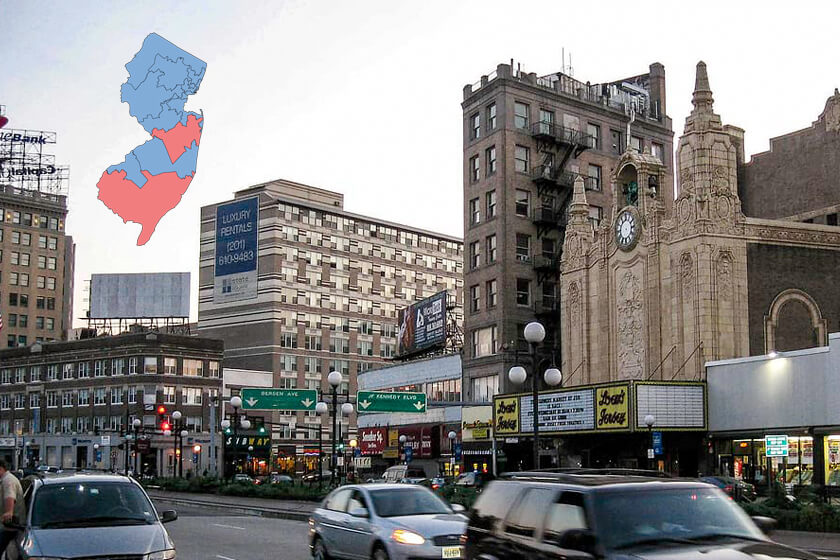West Long Branch, NJ – Democrats Joe Biden and Cory Booker hold substantial leads among New Jersey voters in their races for president and U.S. Senate, respectively. The Monmouth (“Mon-muth”) University Poll finds Democrats also maintain a statewide advantage in the U.S. House of Representatives election, but are facing a tough road in the five most competitive seats that helped contribute to 2018’s “blue wave.” The poll also finds that November’s ballot question to legalize the sale of recreational marijuana has majority support.
In the race for the White House, Biden holds a 16-point advantage over President Donald Trump among registered voters in New Jersey (54% to 38%). Self-described Democrats support Biden by a 93% to 3% margin and Republicans support Trump by a 92% to 6% margin. Independents back Biden 51% to 36%. Hillary Clinton bested Trump by 14 points (55% to 41%) to take the state’s Electoral College votes in 2016.
In the race for U.S. Senate, Booker holds sizable leads over his leading Republican challengers. The incumbent has a 58% to 33% lead against Hirsh Singh and a similar 55% to 32% lead against Rik Mehta. Booker won his 2014 race by 14 points (56% to 42% for Jeff Bell). Booker’s current 20+ point lead over either of his likeliest challengers is large, but it’s worth noting that the state’s other senator, Bob Menendez, held a 21-point lead among registered voters in an April 2018 Monmouth poll (53% to 32% for Bob Hugin). This polling lead shrunk to about 11 points among likely voters by October that year, although prior corruption allegations against the incumbent became a campaign issue that fall.
“The magnitude of the Democratic lead is not unusual when we don’t even have a Republican nominee yet. The race could tighten once voters start paying attention, but that won’t happen until the fall. Still, the fact that a clear majority support Booker’s reelection regardless of the opponent is good news for the incumbent,” said Patrick Murray, director of the independent Monmouth University Polling Institute.
The race for New Jersey’s 12 U.S. House seats produces a more mixed outlook for Democrats. Statewide, the picture looks positive with 50% of voters saying they will back the Democratic candidate in their congressional district and 38% who will support the Republican. This margin is slightly narrower than a Monmouth University Poll conducted at this same point in the 2018 cycle. Democratic candidates held a statewide 19-point generic House vote advantage in April 2018 (54% to 35%), a margin that held into Election Day when Democrats won the cumulative statewide House vote by 21 points (60% to 39%).
The warning sign for Democrats is that this difference from two years ago is primarily due to a shift in voter preferences in the state’s most competitive districts. Democrats have a solid 56% to 31% lead in the seven safest districts – including six held by a Democrat and one held by a Republican – which is nearly identical to their 27-point advantage in April 2018 (57% to 30%). However, voters are almost evenly divided between the Republican (46%) and Democratic (45%) candidates in the five most competitive districts (i.e., CDs 2, 3, 5, 7, 11). This time two years ago, Democrats held an aggregate 7-point edge in these districts (49% to 42%). In November 2018, Democrats ended up winning the cumulative safe seat vote in New Jersey by 33 points (66% to 33%) and the competitive seats by 9 points (54% to 45%).
“Democratic incumbents in New Jersey’s ‘blue wave’ districts face a tough challenge heading into November. The terrain does not look quite as friendly as it did two years ago even with a strong performance by their party at the top of the ticket this year,” said Murray.
New Jersey voters will also be asked to weigh in on whether the state should legalize marijuana. Currently, 61% say they would vote for and 34% would vote against a November ballot measure to amend the state Constitution “to legalize a controlled form of marijuana called cannabis for adults at least 21 years of age” in a market overseen by a state commission. Just 5% have no opinion on this. Support comes from 74% of Democrats, 64% of independents, and 40% of Republicans.
The electorate’s intended vote on the ballot question aligns with recent trends in New Jersey voter opinion on marijuana. Overall, 64% say that in general they support legalizing possession of small amounts of marijuana for personal use, while 32% are opposed. These results are similar to polls taken in 2019 (61% support and 34% oppose) and 2018 (60% support and 35% oppose), while support has grown since 2014 (48% support and 47% oppose).
Over the past six years, Monmouth has also been asking about the specific proposal to allow adults aged 21 years or older to purchase small quantities of marijuana from businesses licensed by the state. Currently, 48% say this is a good idea, 30% say it is a bad idea, and 22% have no opinion on it either way. These results are similar to 2019 (48% good idea, 35% bad idea, 17% no opinion) and more positive than in 2014 (36% good idea, 46% bad idea, 17% no opinion).
“Support for the marijuana ballot measure is widespread in part because many who have no opinion on whether legalization is a good idea figure they might as well vote for it,” said Murray.
Six in ten New Jersey voters (62%) think that legalizing marijuana would help the state’s economy, including 69% of Democrats, 61% of independents, and 55% of Republicans. Just 10% of state voters say it would hurt the economy and 21% say it would have no impact either way. These findings are in line with poll results over the past two years.
In terms of negative consequences, just 27% of New Jersey voters think that legalizing marijuana would lead to an increase in other drug crimes. Nearly as many (22%) believe it will actually lead to a decrease in other drug crimes, but a plurality of all voters (46%) think that marijuana legalization will not have an impact on other drug crimes either way. The number of people who believe that legalizing marijuana will lead to a decrease in other drug crimes is lower than last year (31% in 2019) but those who say it will have no impact is higher (34% in 2019). The number who say it will lead to an increase in other drug crimes is about the same (29% in 2019).
The Monmouth University Poll was conducted by telephone from April 16 to 19, 2020 with 704 New Jersey adults. Results in this release are based on 635 registered voters and have a margin of error of +/- 3.9 percentage points. The poll was conducted by the Monmouth University Polling Institute in West Long Branch, NJ.
QUESTIONS AND RESULTS
(* Some columns may not add to 100% due to rounding.)
[Q1, Q7-10 & Q18-22 held for future release.]
[Q2-6 & Q11-17 previously released.]
23. How likely is it that you will vote in the November election – are you certain to vote, likely to vote, are you not sure, or are you unlikely to vote?
| April 2020 | |
| Certain to vote | 81% |
| Likely to vote | 15% |
| Not sure | 4% |
| Unlikely to vote | 1% |
| (VOL) Definitely won’t vote | 0% |
| (n) | (635) |
24. If the election for President was today, would you vote for … Donald Trump the Republican or Joe Biden the Democrat? [NAMES WERE ROTATED] [If UNDECIDED: If you had to vote for one of the following candidates at this moment, who do you lean toward – Donald Trump or Joe Biden?]
| (with leaners) | April 2020 |
| Donald Trump | 38% |
| Joe Biden | 54% |
| (VOL) Other candidate | 2% |
| (VOL) No one | 0% |
| (VOL) Undecided | 6% |
| (n) | (635) |
[Question 25A was asked of a random half-sample: moe= +/- 5.5%]
25A. There will also be an election for U.S. Senate in November. If the election for senator was today, would you vote for Rik Mehta the Republican or Cory Booker the Democrat? [NAMES WERE ROTATED] [If UNDECIDED: If you had to vote for one of the following candidates at this moment, who do you lean toward – Rik Mehta or Cory Booker?]
| (with leaners) | April 2020 |
| Rik Mehta the Republican | 32% |
| Cory Booker the Democrat | 55% |
| (VOL) Other candidate | 2% |
| (VOL) No one | 0% |
| (VOL) Undecided | 11% |
| (n) | (317) |
[Question 25B was asked of a random half-sample: moe= +/- 5.5%]
25B. There will also be an election for U.S. Senate in November. If the election for senator was today, would you vote for Hirsh Singh the Republican or Cory Booker the Democrat? [NAMES WERE ROTATED] [If UNDECIDED: If you had to vote for one of the following candidates at this moment, who do you lean toward – Hirsh Singh or Cory Booker?]
| (with leaners) | April 2020 |
| Hirsh Singh the Republican | 33% |
| Cory Booker the Democrat | 58% |
| (VOL) Other candidate | 0% |
| (VOL) No one | 0% |
| (VOL) Undecided | 9% |
| (n) | (319) |
26. If the election for U.S. House of Representatives was held today, would you vote for the Republican or the Democratic candidate in your Congressional district? [ITEMS WERE ROTATED] [If UNDECIDED: At this time do you lean more toward the Republican or more toward the Democratic candidate?]
| (with leaners) | April 2020 |
| Republican | 38% |
| Democrat | 50% |
| (VOL) Other candidate | 0% |
| (VOL) No one | 0% |
| (VOL) Undecided | 11% |
| (n) | (635) |
27. Overall, do you support or oppose legalizing the possession of small amounts of marijuana for personal use?
| TREND: | April 2020 | Feb. 2019 | April 2018 | April 2014 |
| Support | 64% | 61% | 60% | 48% |
| Oppose | 32% | 34% | 35% | 47% |
| (VOL) Don’t know | 4% | 5% | 5% | 5% |
| (n) | (635) | (549) | (632) | (690) |
28. There is currently a proposal in New Jersey to allow anyone over the age of 21 to purchase small quantities of marijuana for their own use from businesses that have been licensed by the state government to sell marijuana. Do you think this is a good idea or bad idea, or do you have no opinion on it?
TREND: | April 2020 | Feb. 2019 | April 2014 |
| Good idea | 48% | 48% | 36% |
| Bad idea | 30% | 35% | 46% |
| No opinion | 22% | 17% | 17% |
| (n) | (635) | (549) | (690) |
29. This proposal will be put on the ballot for a public vote in November. If the election was today, would you vote FOR or AGAINST amending the New Jersey state Constitution to legalize a controlled form of marijuana called cannabis for adults at least 21 years of age? A State commission would oversee the personal use cannabis market.
| April 2020 | |
| For | 61% |
| Against | 34% |
| (VOL) Don’t know | 5% |
| (n) | (635) |
30. Do you think legalizing marijuana in New Jersey would help the state’s economy, hurt the state’s economy, or have no impact on the state’s economy?
TREND: | April 2020 | Feb. 2019 | April 2018 |
| Help | 62% | 68% | 59% |
| Hurt | 10% | 12% | 15% |
| No impact | 21% | 16% | 21% |
| (VOL) Don’t know | 7% | 5% | 4% |
| (n) | (635) | (549) | (632) |
31. Do you think legalizing marijuana in New Jersey would lead to an increase in other drug crimes, lead to a decrease in other drug crimes, or have no impact on the number of other drug crimes?
TREND: | April 2020 | Feb. 2019 | April 2018 |
| Increase | 27% | 29% | 30% |
| Decrease | 22% | 31% | 27% |
| No impact | 46% | 34% | 40% |
| (VOL) Don’t know | 5% | 6% | 4% |
| (n) | (635) | (549) | (632) |
[Q32-35 held for future release.]
METHODOLOGY
The Monmouth University Poll was sponsored and conducted by the Monmouth University Polling Institute from April 16 to 19, 2020 with a random sample of 704 New Jersey adults age 18 and older, in English. This includes 316 contacted by a live interviewer on a landline telephone and 388 contacted by a live interviewer on a cell phone. The results in this poll release are based on a subsample of 635 registered voters. Telephone numbers were selected through random digit dialing and landline respondents were selected with a modified Troldahl-Carter youngest adult household screen. Monmouth is responsible for all aspects of the survey design, data weighting and analysis. The full sample is weighted for region, age, education, gender and race based on US Census information (ACS 2018 one-year survey). Data collection support provided by Braun Research (field) and Dynata (RDD sample). For results based on the registered voter sample, one can say with 95% confidence that the error attributable to sampling has a maximum margin of plus or minus 3.9 percentage points (unadjusted for sample design). Sampling error can be larger for sub-groups (see table below). In addition to sampling error, one should bear in mind that question wording and practical difficulties in conducting surveys can introduce error or bias into the findings of opinion polls.
| DEMOGRAPHICS (weighted) |
| Registered Voters |
| Self-Reported |
| 26% Republican |
| 38% Independent |
| 36% Democrat |
| 46% Male |
| 54% Female |
| 27% 18-34 |
| 35% 35-54 |
| 38% 55+ |
| 60% White |
| 12% Black |
| 18% Hispanic |
| 11% Asian/Other |
| 60% No degree |
| 40% 4 year degree |
Click on pdf file link below for full methodology and crosstabs by key demographic groups.




